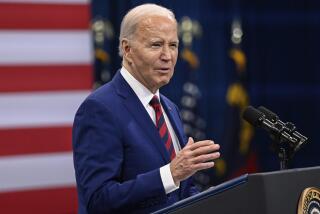Gaining delegates is Tuesday’s goal
Today -- Super Tuesday -- residents in 24 states and American Samoa will vote in the largest single day of balloting in the history of presidential primaries.
Democratic and Republican candidates have spent days scrambling from California to New York, and in between, racing from tarmac to town hall meeting, staging rallies, conducting satellite interviews, filling the airwaves with ads and stuffing mailboxes with their targeted appeals.
FOR THE RECORD:
Convention delegates: A graphic in Tuesday’s Section A of Super Tuesday states defined the “winner take all” type of primary inaccurately. Candidates in each state receiving the most votes from a party’s state caucuses or primary do not necessarily get all of that state’s delegates at the national convention. Rather, the candidate receiving the most votes from a party’s state caucuses, a state primary or within a specific voting category —such as a congressional district -- gets the delegates within that voting category, and some at-large delegates may also be awarded based on criteria unique to that state. For example, California’s Republican primary is winner-take-all by congressional district, with candidates winning additional delegates for carrying the statewide vote.
The goal is simple: to acquire as many delegates as possible. But the distance is vast and the rules for most contests vary, adding layers of complexity to the challenge facing candidates and their strategists.
Why are so many states voting at once?
Because politicians and party activists across the country wanted a bigger say in the nominating process. The two major parties set today as the first day most states could schedule their elections without penalty. (Florida, for instance, was stripped of delegates for holding its primary last week.) After California and other big states moved forward, others worried about being overshadowed. So they set their elections for today as well.
Is the vote the same for both parties in every state?
No. In Kansas, for example, Democrats vote today and Republicans on Saturday. West Virginia Republicans will pick delegates today at a state convention, but Democrats won’t vote until May. Some states are holding primaries, others caucuses.
Why isn’t there more uniformity?
Because the two major political parties have no say over how states conduct elections. The parties can use incentives -- like giving or taking away delegates to this summer’s national nominating conventions -- to get the states to comply with their wishes. But in the end, states are free to run elections as they choose.
Do the states decide how delegates are awarded?
No, that is decided by the political parties, which also determine who can vote in their primary or caucus. In some states, unaffiliated or “independent” voters can participate, but that varies by party. In California, independents can vote in today’s Democratic primary but not the GOP’s.
How do the parties parcel out their delegates?
That’s where things get really complicated. The Republican system is designed to hasten selection of a nominee so the party can unify behind the front-runner. To that end, the GOP in most states awards delegates on a winner-take-all basis. The formula varies; in some states, such as Arizona and Missouri, all the delegates go to the winner of the statewide popular vote. In other states, like California and Alabama, it is winner-take-all by congressional district, with candidates winning additional delegates for carrying the statewide vote. In a few other states, Alaska and Massachusetts among them, delegates are awarded proportionally based on the overall vote.
Democrats tend to worry more about giving different groups a say in the process. So they award their delegates proportionally through a combination of the statewide vote and a candidate’s performance in individual congressional districts. Democrats have no winner-take-all states. That means a candidate can lose the popular vote in a state but, by running strongly in certain areas, walk away with a healthy chunk of delegates.
How many delegates are at stake today?
On the Democratic side, 1,681 pledged delegates are up for grabs in 22 states and American Samoa; it takes 2,025 delegates to secure the Democratic nomination at the party’s August convention in Denver. On the Republican side, there will be contests in 21 states with 1,015 pledged delegates at stake; it takes 1,191 to win the nomination at the GOP’s September convention in Minneapolis.
Who’s ahead in delegates so far?
According to the Associated Press, Democratic Sen. Hillary Rodham Clinton of New York has 261 delegates and Sen. Barack Obama of Illinois has 196. On the Republican side, Sen. John McCain of Arizona has the most delegates, 102, followed by former Massachusetts Gov. Mitt Romney with 93, former Arkansas Gov. Mike Huckabee with 43, and Rep. Ron Paul of Texas with four.
Who are the “super delegates” and how do you become one?
Super delegates are people automatically granted a vote in the Democratic nominating process by dint of their office, or the political position they once held. Members of Congress and the nation’s Democratic governors are super delegates. So are former Presidents Clinton and Carter and former Vice President Al Gore. There are 796 super delegates and they are free to support whomever they choose. The category was created to give the party establishment a say in the selection of the party’s nominee.
The Republicans do not have super delegates.
How do you become a regular delegate?
The rules are different in each state. Generally speaking, you must be registered to vote and a member of a political party to become one of its delegates. In some states, delegates run for election; it is their name you will see on the ballot today next to the candidate they support. In California, Democratic delegates are elected at caucuses in April. On the Republican side, the candidates appoint their delegates.
Are delegates bound to support the candidate they pledged to support once they get to the party conventions?
Again, the rules vary. On the Republican side, some states require delegates to stick by a candidate for a certain number of ballots. Others don’t. On the Democratic side, despite the use of the term “pledged delegates,” in reality they are not required to support a particular candidate once they get to the convention, though they are expected to do so.
Will today’s vote settle the two nominating fights?
That was the assumption not long ago. But now it looks less certain, especially on the Democratic side. Any forecast has to be taken advisedly, given the twists the campaign has already seen.
Depending on the outcome, Super Tuesday could give McCain a big boost toward securing the GOP nomination. Polls show him running ahead of Romney in some big winner-take-all states, which could significantly pad McCain’s delegate count and lengthen the odds that Romney can overtake him.
For Democrats, it is hard to envision anything other than a continued fight between Clinton and Obama. The proportional allocation of delegates and the fact both are waging well-financed, strongly competitive campaigns suggests each will walk away today claiming a victory of some sort. That gives both a strong incentive to press on as the race heads into Virginia, Maryland and the District of Columbia for next week’s contests on “Chesapeake Tuesday.”
More to Read
Start your day right
Sign up for Essential California for news, features and recommendations from the L.A. Times and beyond in your inbox six days a week.
You may occasionally receive promotional content from the Los Angeles Times.







